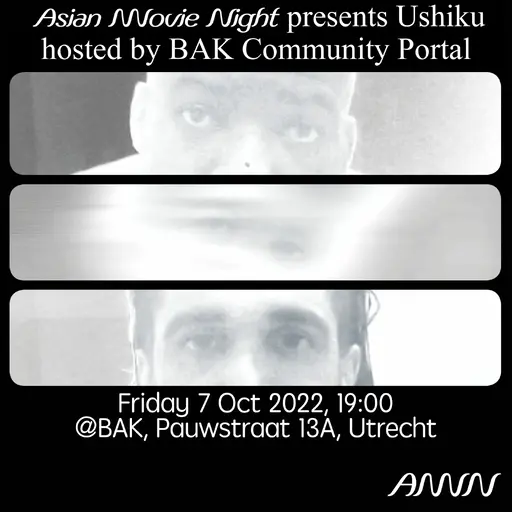
BAK Community Portal hosts...
Screening followed by a panel discussion with the director and members from activist groups Migrante, SEHAQ and Papaya Kuir.
Ushiku (2021), Thomas Ash, documentary, 1hr 27mins*
Ushiku (2021) exposes the hostile nature of Japan’s hushed up discriminatory immigration system and the human rights violations it imbues, against the backdrop of the ensuing COVID-19 pandemic and with the spectacle of the Tokyo Olympics looming on the immediate horizon.
The ‘Ushiku’ immigration center near Tokyo mainly holds people seeking refuge in Japan. On the eve of Japan’s recent – and highly contentious – immigration reform efforts, director Thomas Ash bypasses the media blackout the government has imposed on its immigration centres by using a hidden camera, bringing viewers into immediate contact with the Ushiku’s detainees, many of whom are refugees seeking asylum. The documentary delves deep into the horrible reality of physical and mental abuse that prevails in these centres, as well as Japan’s notoriously cruel immigration policy, which has accepted only 0,4% of refugee applicants over the last ten years.
Thomas Ash, director
In his films, Thomas Ash broadly focuses on issues surrounding health and medicine. Two of his documentaries, In the Grey Zone (2012) and A2-B-C (2013), feature children living in areas of Fukushima contaminated by the 2011 nuclear meltdown. His recent work has focused on the theme of death and dying, including -1287 (2014) and Sending Off (2019). Ash also served as Executive Producer of Boys for Sale (2017, dir: Itako), a documentary about male sex workers in Tokyo.
About Ushiku, he said: “I first began visiting the immigration facility in Ushiku as a volunteer and was deeply affected by hearing the stories of some of the people being detained. It was only then that I began to think about how to use the power of film to bring this story to the attention of the Japanese public and the world. My motivation was not to make a film, but rather as a witness to human rights violations, I felt morally compelled to document evidence in the form of filming the detainees’ testimonies; to document their truth.”
Jun Saturay from Migrante
Jun Saturay is an artist / cultural worker / activist currently based in Utrecht, The Netherlands.
Back in the Philippines, he was an environmental defender and human rights worker. He applied for political asylum in the Netherlands in 2003 after more than 40 of his fellow environmental activists opposing a mining project were murdered during the regime of former Philippine president Gloria Macapagal Arroyo. Aside from advocating for the rights and welfare of migrants and refugees in the Netherlands, he continues his activism in support of the struggle of the Filipino people for justice, peace, and genuine social change.
Migrante Netherlands is an alliance of Filipino migrant organizations in The Netherlands. It upholds and defends the rights of overseas Filipinos in the country, and is part of the national democratic movement that aspires for national and social liberation of Philippine society.
Nisrine Chaer from SEHAQ
Nisrine Chaer is a researcher and organizer who lives in Lebanon and the Netherlands. In 2017, he co-founded SEHAQ. He is also a member of a queer mutual aid group in Beirut. Chaer is working on a PhD project at Utrecht University about geographies of home with a focus on queer & trans migration in Lebanon and the Netherlands.
SEHAQ, Queer Refugees Group is a refugee-led collective that raises awareness, hosts community events, and creates safer spaces for lesbian, gay, bisexual, trans* and queer (LGBTQ) asylum seekers, refugees and undocumented people in the Netherlands, and which centres the experiences of refugees from the Middle East & North African regions. Adopting a leftist feminist approach to politics, SEHAQ also aspires to create solidarity networks between the Dutch-based queer and trans refugee/diaspora community and the (activist) communities in the global South / MENA.
Alejandra Ortiz from Papaya Kuir
Papaya Kuir is a migrant and transfeminist collective by and for Latin American trans and queer people in the Netherlands.
Alejandra Ortiz is a writer, researcher, and grassroots activist, who is also a Mexican trans woman with a history of marginalization and violence. Her history includes poverty and intrafamilial violence, sex work, use of drugs, experience of being a refugee and undocumented migrant. Alejandra has been living in the Netherlands since 2015, where she devotes her activism to the visibility and empowerment of marginalized communities as part of BIPOC organizations and collectives such as TNN, Trans United Europe, Trans Magazine, Amsterdam Pride, Melkweg Expo and her collective Papaya Kuir, among others. Her book De waarheid zal me bevrijden is published 25 October 2022 (Lebowski).
Asian Movie Night
Asian Movie Night is a roaming film initiative who introduces a wide range of Asian films of various genres to the public in the Netherlands, with curated themes and after-movie sessions to open up discussions. With a love for Asian films, the initiative aims to bring in different narratives and aesthetics to a broader audience in a comfortable environment and accessible format through collaboration with different venues.
PROGRAM
18:30 Doors open
19:00 Introduction
19:10 Start screening
20:40 End screening + tea / coffee break
20:55 Panel discussion + Q&A
After talk with director Thomas Ash and members from Dutch activist groups Migrante, Sehaq and Papaya Kuir, discussing migration policy, borders and empathy, with a focus on BIPOC queer struggles.
21:45 End of event
*Content warning: contains state violence, transphobia and mentions of suicide.